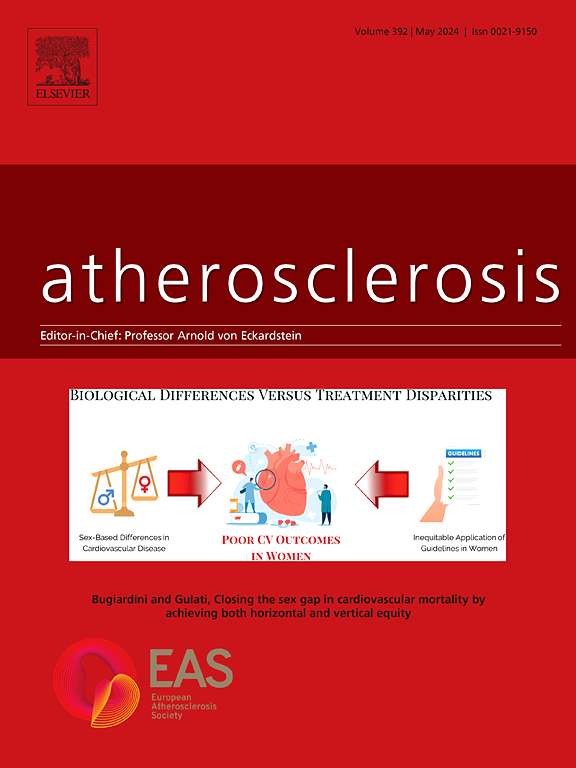冠状动脉疾病和广泛性焦虑障碍患者使用SSRI与心血管预后之间的关系:一项真实世界队列研究
IF 4.9
2区 医学
Q1 CARDIAC & CARDIOVASCULAR SYSTEMS
引用次数: 0
摘要
背景和目的冠状动脉疾病(CAD)是导致心血管疾病死亡的主要原因,而广泛性焦虑症(GAD)在CAD患者中非常普遍,会恶化心血管疾病的预后。虽然选择性5 -羟色胺再摄取抑制剂(SSRIs)是焦虑症的一线治疗方法,但它们对CAD和广泛性焦虑症患者心血管预后的影响尚不清楚。方法本回顾性队列研究利用来自TriNetX数据库的真实数据。纳入2016年至2025年间诊断为CAD和GAD的患者,并将其分为SSRI使用者和非使用者。倾向评分匹配(PSM)用于平衡基线特征。主要结局是主要不良心血管事件(MACE),包括心肌梗死、卒中和全因死亡率。次要结局包括个体MACE成分和全因住院。采用Cox比例风险模型估计风险比(hr)。结果经1:1 PSM后,54,526名SSRIs服用者和54,526名非服用者进行了分析。SSRIs的使用与MACE的1年风险降低显著相关(HR: 0.77, 95% CI: 0.74-0.81, p <;0.001)。在继发性结局和亚组(如糖尿病、肥胖、血脂异常和尼古丁依赖)中观察到类似的保护作用。里程碑式分析证实了一致的结果。阴性对照分析显示无显著差异,使偏倚最小化。结论:在CAD和GAD患者中,ssris的使用与较低的一年MACE率相关。这些发现强调了SSRIs在这一人群中潜在的心血管益处。需要进一步的临床试验来验证这些结果并探索长期效果。本文章由计算机程序翻译,如有差异,请以英文原文为准。
Association between SSRI use and cardiovascular outcomes in patients with coronary artery disease and generalized anxiety disorder: A real-world cohort study
Background and aims
Coronary artery disease (CAD) is a leading cause of cardiovascular mortality, and generalized anxiety disorder (GAD) is highly prevalent among CAD patients, worsening cardiovascular outcomes. While selective serotonin reuptake inhibitors (SSRIs) are first-line treatments for anxiety disorders, their impact on cardiovascular prognosis in patients with CAD and GAD remains unclear.
Methods
This retrospective cohort study utilized real-world data from the TriNetX database. Patients diagnosed with both CAD and GAD between 2016 and 2025 were included and categorized into SSRI users and non-users. Propensity score matching (PSM) was applied to balance baseline characteristics. The primary outcome was major adverse cardiovascular events (MACE), including myocardial infarction, stroke, and all-cause mortality. Secondary outcomes included individual MACE components and all-cause hospitalization. Hazard ratios (HRs) were estimated using Cox proportional hazards models.
Results
After 1:1 PSM, 54,526 SSRIs users and 54,526 non-users were analyzed. SSRIs use was significantly associated with a lower one-year risk of MACE (HR: 0.77, 95 % CI: 0.74–0.81, p < 0.001). Similar protective effects were observed across secondary outcomes and subgroups, such as diabetes mellitus, obesity, dyslipidemia, and nicotine dependence. Landmark analyses confirmed consistent results. Negative control analyses showed no significant differences, minimizing bias.
Conclusion
SSRIs use is associated with a lower one-year MACE rate in patients with CAD and GAD. These findings highlight the potential cardiovascular benefits of SSRIs in this population. Further clinical trials are warranted to validate these results and explore long-term effects.
求助全文
通过发布文献求助,成功后即可免费获取论文全文。
去求助
来源期刊

Atherosclerosis
医学-外周血管病
CiteScore
9.80
自引率
3.80%
发文量
1269
审稿时长
36 days
期刊介绍:
Atherosclerosis has an open access mirror journal Atherosclerosis: X, sharing the same aims and scope, editorial team, submission system and rigorous peer review.
Atherosclerosis brings together, from all sources, papers concerned with investigation on atherosclerosis, its risk factors and clinical manifestations. Atherosclerosis covers basic and translational, clinical and population research approaches to arterial and vascular biology and disease, as well as their risk factors including: disturbances of lipid and lipoprotein metabolism, diabetes and hypertension, thrombosis, and inflammation. The Editors are interested in original or review papers dealing with the pathogenesis, environmental, genetic and epigenetic basis, diagnosis or treatment of atherosclerosis and related diseases as well as their risk factors.
 求助内容:
求助内容: 应助结果提醒方式:
应助结果提醒方式:


